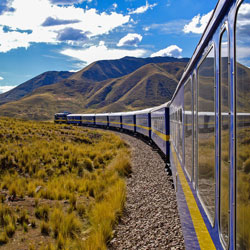
Germany has moved to take the lead from China to spearhead a new coast-to-coast transport route across Latin America. German Secretary of Transport Rainer Bomba was in La Paz, Bolivia, in March with representatives from 40 German companies to meet with authorities from five countries — Bolivia, Brazil, Paraguay, Peru and Uruguay — to discuss a 2,300-mile railroad across South America.
It was the second meeting this year, with transport ministers from the region invited to German in January. The Swiss government also participated in that meeting.
If the project moves ahead, Germany would trump two Chinese-led projects, the proposed $50bn canal in Nicaragua and a different $60bn railroad that would have linked the Atlantic and Pacific Oceans through Brazil and Peru.
Local authorities are fully behind the project, which would likely require $15bn in investment. “We are fully in,” said Paraguayan Finance Minister Santiago Peña on the sidelines of the annual Inter-American Development Bank meeting. “We don’t see any way that the bi-oceanic train not going through Paraguay. If you look at the map it needs to go through Paraguay.”
The Peruvian government has already conducted an initial study of its part of the project, which would start in Tacna, the country’s southern-most city. Transportation minister Martin Vizcarra said Peru begin work shortly on a full feasibility study.
“Bolivia has taken the lead for this project,” said Vizcarra after the March meeting in La Paz. “I am a witness to the German government’s interest in seeing this go ahead.”
Bolivia’s public works minister Milton Claros announced this week that a draft memorandum was being circulated among the participating countries. He said formal negotiations would include four working groups and should get underway in April. Each of the countries involved will name two representatives.
Gaining traction
While the dream of an inter-oceanic train has been tossed around for more than a century, the new plan gained traction earlier this year when an alternative Chinese-backed project through the Brazilian and Peruvian Amazon fell apart. The economic feasibility plan came up with a $60bn price tag and serious questions were raised about the environmental impact.
“The environmental costs of moving the railroad farther north are huge, because it would go through the Amazon,” said Peña. He said Paraguay’s president, Horacio Cartes, had met several times with Bolivia’s Evo Morales to talk about the railroad. He said the two presidents were pragmatic and “are together in this effort to strengthen integration in concrete ways, and not with just more rhetoric”.
Economically, it would also open up much greater options than previous plans, providing a way for landlocked Bolivia and Paraguay to move products more efficiently to the coasts. It would provide Brazil with the same opportunity to get farm products and miners to the Pacific coast as a gateway to Asia.
The other costly bi-coastal project in Nicaragua continues to languish, despite full backing from the country’s government. Chinese developer HKND proposed the 178-mile Nicaragua Canal early in the decade. The Nicaraguan Congress approved it in 2013, but so far no work has been done on the waterway, which would rival the Panama Canal.
Nicaragua’s Supreme Court rejected another legal challenge in March by farmers’ groups opposed to the canal. Opponents have vowed to continue protests in April to stop the canal.
